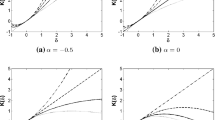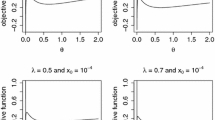Abstract
Robust inference based on the minimization of statistical divergences has proved to be a useful alternative to the classical maximum likelihood based techniques. Recently Ghosh et al. (A Generalized Divergence for Statistical Inference, 2013a) proposed a general class of divergence measures for robust statistical inference, named the S-divergence family. Ghosh (Sankhya A, doi:10.1007/s13171-014-0063-2, 2014) discussed its asymptotic properties for the discrete model of densities. In the present paper, we develop the asymptotic properties of the minimum S-divergence estimators under continuous models. Here we use the Basu–Lindsay approach (Ann Inst Stat Math 46:683–705, 1994) of smoothing the model densities that, unlike previous approaches, avoids much of the complications of the kernel bandwidth selection. Illustrations are presented to support the performance of the resulting estimators both in terms of efficiency and robustness through extensive simulation studies and real data examples.









Similar content being viewed by others
References
Altman T, Leger C (1994) Cross-validation, the bootstrap, and related methods for tuning parameter selection. Technical Report, The Cornell University Library
Basu A, Harris IR, Hjort NL, Jones MC (1998) Robust and efficient estimation by minimising a density power divergence. Biometrika 85:549–559
Basu A, Lindsay BG (1994) Minimum disparity estimation for continuous models: efficiency, distributions and robustness. Ann Inst Stat Math 46:683–705
Basu A, Shioya H, Park C (2011) Statistical inference: the minimum distance approach. Chapman & Hall/CRC, Boca Raton
Beran RJ (1977) Minimum Hellinger distance estimates for parametric models. Ann Stat 5:445–463
Bickel PJ (1978) Some recent developments in robust statistics. Presented at the 4th Australian statistical conference
Bregman LM (1967) The relaxation method of finding the common point of convex sets and its application to the solution of problems in convex programming. USSR Comput Math Math Phys 7:200–217
Brown LD, Hwang JTG (1993) How to approximate a histogram by a normal density. Am Stat 47(4):251–255
Burbea J, Rao CR (1982) Entropy differential metric, distance and divergence measures in probability spaces: a unified approach. J Multivar Anal 12:575–596
Cressie N, Read TRC (1984) Multinomial goodness-of-fit tests. J R Stat Soc B 46:440–464
Csiszár I (1963) Eine informations theoretische Ungleichung und ihre Anwendung auf den Beweis der Ergodizitat von Markoffschen Ketten. Publ Math Inst Hungar Acad Sci 3:85–107
Donoho DL, Liu RC (1988) The “automatic”’ robustness of minimum distance functionals. Ann Stat 552–586
Fang Y, Wang B, Feng Y (2013) Tuning parameter selection in regularized estimations of large covariance matrices. J Stat Comput Simul 84(7):1597–1607
Ghosh A (2014) Asymptotic properties of minimum \(S\)-divergence estimator for discrete models. Sankhya A. doi:10.1007/s13171-014-0063-2
Ghosh A, Basu A (2013) Robust estimation for independent non-homogeneous observations using density power divergence with applications to linear regression. Electron J Stat 7:2420–2456
Ghosh A, Basu A (2015a) Robust estimation in generalised linear models : the density power divergence approach. TEST. doi:10.1007/s11749-015-0445-3
Ghosh A, Basu A (2015b) Robust Bayes estimation using the density power divergence. Ann Inst Stat Math. doi:10.1007/s10463-014-0499-0
Ghosh A, Basu A (2015c) Robust estimation for non-homogeneous data and the selection of the optimal tuning parameter: the density power divergence approach. J Appl Stat. doi:10.1080/02664763.2015.1016901
Ghosh A, Basu A, Pardo L (2015) On the robustness of a divergence based test of simple statistical hypotheses. J Stat Plan Inference 161:91–108
Ghosh A, Harris IR, Maji A, Basu A, Pardo L (2013a) A Generalized Divergence for Statistical Inference. Technical Report (BIRU/2013/3), Bayesian and Interdisciplinary Research Unit, Indian Statistical Institute, India
Ghosh A, Maji A, Basu A (2013b) Robust inference based on divergences in reliability systems. Applied reliability engineering and risk analysis. Probabilistic models and statistical inference, Ilia Frenkel, Alex, Karagrigoriou, Anatoly Lisnianski & Andre Kleyner, Eds, Dedicated to the Centennial of the birth of Boris Gnedenko, Wiley, New York, USA
Hong C, Kim Y (2001) Automatic selection of the tuning parameter in the minimum density power divergence estimation. J Korean Stat Soc 30:453–465
Jones MC, Hjort NL, Harris IR, Basu A (2001) A comparison of related density-based minimum divergence estimators. Biometrika 88(3):865–873
Kawano S (2014) Selection of tuning parameters in bridge regression models via Bayesian information criterion. Stat Pap 55(4):1207–1223
Kullback S, Leibler RA (1951) On information and sufficiency. Ann Math Stat 22:79–86
Landaburu E, Morales D, Pardo L (2005) Divergence-based estimation and testing with misclassified data. Stat Pap 46(3):397–409
Lee T, Lee S (2009) Consistency of minimizing a penalized density power divergence estimator for mixing distribution. Stat Pap 50(1):67–80
Lindsay BG (1994) Efficiency versus robustness: the case for minimum Hellinger distance and related methods. Ann Stat 22:1081–1114
Martin N, Pardo L (2008) Minimum phi-divergence estimators for log-linear models with linear constraints and multinomial sampling. Stat Pap 49(1):15–36
Menendez M, Morales D, Pardo L, Salicru M (1995) Asymptotic behavior and statistical applications of divergence measures in multinomial populations: a unified study. Stat Pap 36(1):1–29
Menendez M, Morales D, Pardo L, Vajda I (1998) Two approaches to grouping of data and related disparity statistics. Commun Stat-Theory Methods 27(3):609–633
Menendez M, Pardo L, Pardo MC (2009) Preliminary phi-divergence test estimators for linear restrictions in a logistic regression model. Stat Pap 50(2):277–300
Mihoko M, Eguchi S (2002) Robust blind source separation by beta divergence. Neural Comput 14(8):1859–1886
Pardo JA, Pardo L, Pardo MC (2006) Minimum \(\Phi \)-divergence estimator in logistic regression models. Stat Pap 47(1):91–108
Park H, Sakaori F, Sadanori Konishi S (2014) Robust sparse regression and tuning parameter selection via the efficient bootstrap information criteria. J Stat Comput Simul 84(7):1597–1607
Patra S, Maji A, Basu A, Pardo L (2013) The power divergence and the density power divergence families: the mathematical connection. Sankhya B 75:16–28
Pearson K (1900) On the criterion that a given system of deviations from the probable in the case of a correlated system of variables is such that it can be reasonably supposed to have arisen from random sampling. Philos Mag 50:157–175
Rieder H (1994) Robust asymptotic statistics. Springer, New York
Scott DW (2001) Parametric statistical modeling by minimum integrated square error. Technometrics 43:274–285
Simpson DG (1987) Minimum Hellinger distance estimation for the analysis of count data. J Am Stat Assoc 82:802–807
Simpson DG (1989) Hellinger deviance test: efficiency, breakdown points, and examples. J Am Stat Assoc 84:107–113
Stigler SM (1977) Do robust estimators work with real data? Ann Stat 5:1055–1098
Tamura RN, Boos DD (1986) Minimum Hellinger distance estimation for multivariate location and covariance. J Am Stat Assoc 81:223–229
Toma A, Broniatowski M (2010) Dual divergence estimators and tests: robustness results. J Multivar Anal 102:20–36
Warwick J, Jones MC (2005) Choosing a robustness tuning parameter. J Stat Comput Simul 75:581–588
Wied D, Weibach R (2012) Consistency of the kernel density estimator: a survey. Stat Pap 53(1):1–21
Acknowledgments
The authors thank the editor and two anonymous referees for several useful suggestions and comments that lead to an improved version of the manuscript.
Author information
Authors and Affiliations
Corresponding author
Electronic supplementary material
Below is the link to the electronic supplementary material.
Rights and permissions
About this article
Cite this article
Ghosh, A., Basu, A. The minimum S-divergence estimator under continuous models: the Basu–Lindsay approach. Stat Papers 58, 341–372 (2017). https://doi.org/10.1007/s00362-015-0701-3
Received:
Revised:
Published:
Issue Date:
DOI: https://doi.org/10.1007/s00362-015-0701-3




